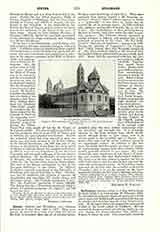

Spillmann, JOSEPH, author, b. at Zug, Switzerland, April 22, 1842; d. at Luxemburg, February 20, 1905. He attended the primary school and gymnasium of his native town, but feeble health necessitated his leaving his studies and devoting himself to his father’s business. At the age of sixteen he resumed his interrupted studies at the Jesuit college of Feldkirch. Having entered the Jesuit novitiate at Gorheim (1862), he was sent, during the Franco-Prussian War (1870), to France, to nurse the sick. Two years later, when his order was banished from Germany, he went to England to complete his theological studies, and in 1874 was ordained priest. The life work of Spillmann, who had already shown his poetical gift in his contributions to “Der Hausfreund” (a calendar published by Father Pachtler in 1872), was clearly marked out for him. He was appointed collaborator on the “Stimmen aus Maria-Laach” (founded in 1871) and the “Katholische Missionen” (founded in 1873).
Spillmann’s fruitful literary activity resulted chiefly from his connection with these periodicals, especially the “Katholische Missionen”, which he edited from 1880 to 1890. From his “Beilagen fur die Jugend” grew seven portly volumes of “Reisebilder”, while twenty-one booklets, “Aus fernen Landern”, owe their origin to the same source; these consisted of edifying and tastefully illustrated stories for the young, with whom they have become favorites, as the numerous editions and translations prove. His comprehensive “Geschichte der Katholikenverfolgung in England von 1535-1681″ began with articles in the “Stimmen aus Maria-Laach“, was continued in the supplements to this periodical, and was completed in five large volumes. For the calendar, the “Hausfreund”, which was given up in 1881, Spillmann wrote many stories; these were afterwards collected under the title “Wolken and Sonnenschein”, eight pretty stories for the young which have been frequently republished and translated into other languages. Spillmann also wrote seven longer romances, the first (Die Wunderblume von Woxindon) appearing in 1893; and the last (Der schwarze Schumacher) ten years later; they are written in the style of his favorite authors, Sir Walter Scott and Charles Dickens. An eighth romance was sketched, but a serious illness prevented its completion. Spillmann’s importance arises chiefly from his works for the young.
N. SCHEID

